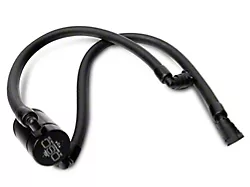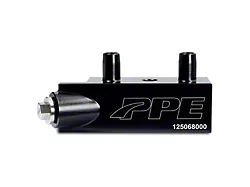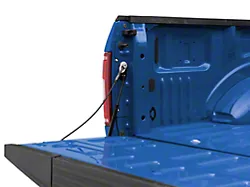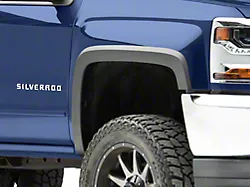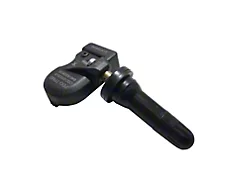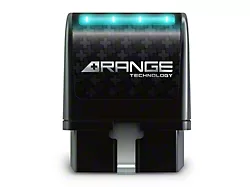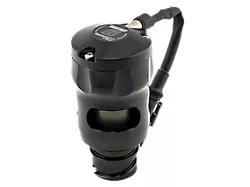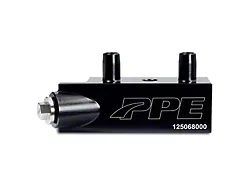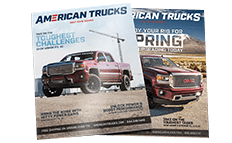
How to Install dB Performance by Corsa 3 in. Sport Cat-Back Exhaust w/ Polished Tip - Single Side Exit (07-13 4.8L Sierra 1500) on your GMC Sierra
Tools Required
- Tape Measure
- Black Marking Pen
- 15mm Socket & Ratchet
- Chain Style Pipe Cutter
- Grommet Pullers
- Soap & Water Solution
- Safety Glasses
- Torque Wrench
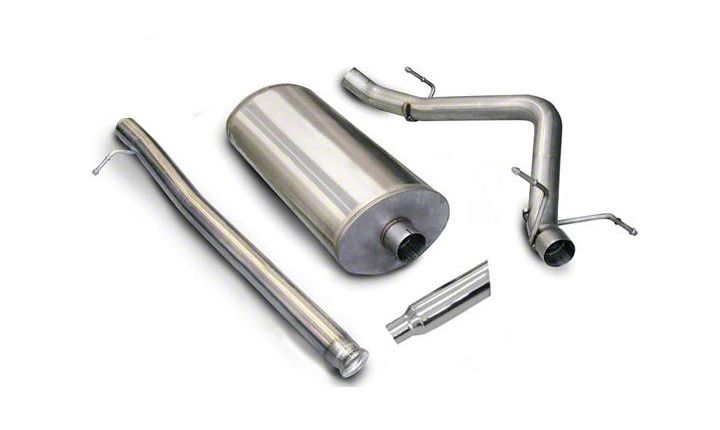
Shop Parts in this Guide
- dB Performance by Corsa Sport Single Exhaust System with Polished Tip; Side Exit (07-13 4.8L Sierra 1500)
- dB Performance by Corsa Sport Single Exhaust System with Polished Tip; Side Exit (07-13 5.3L Sierra 1500)
- dB Performance by Corsa Sport Single Exhaust System with Polished Tip; Side Exit (07-09 6.0L Sierra 1500, Excluding Hybrid)



Stock Exhaust Removal Instructions
1) Scribe a line 12" from the front face of the stock muffler. (See Fig. A)
2) Place a chain style cutter around the exhaust pipe at the scribe line location and cut the exhaust pipe. (See Fig. B)
3) Remove the grommets from the tailpipe hangers at the muffler exit, the spare tire and finally ahead of the muffler, using grommet pullers or similar device. (See Fig's C, D & E)
Note: Using a soapy solution on the grommet hole will make the job easier.
4) Use a 15mm socket and ratchet to remove the flange nuts at the flange connection of the head-pipe. (See Fig's F & G)
5) Remove the muffler and rear tailpipe section from the vehicle by lifting the tailpipe over the rear axle and forwards toward the front of the vehicle. (See Fig's H & I) This completes the removal of the stock system.



Installation of dB Performance Exhaust System:
NOTE: The supplied double edge clamps in this system will crush and permanently deform the exhaust piping as they are tightened. DO NOT tighten these clamps any more than is necessary to lightly hold the exhaust components in place, until the very end of this installation process. It will be difficult or impossible to make any positional or rotational adjustments to the exhaust system after these clamps have been tightened down.
VERY IMPORTANT: Align all clamps so that the open edge of the clamp bracket is parallel and aligned with the notch in the pipe, and the outside edge of the clamp bracket is approximately 1/8" from the end of the pipe expansion. (See Fig. 1) Failure to properly position or orient the clamps could result in a weak clamping load, or even a potential leak at the clamp joints.
IMPORTANT: Make sure that the small drain holes in the muffler are facing down when the muffler is installed. (See Fig. 2)


1) Locate the dB Head Pipe assembly and slide the flange over the studs on the factory flange. Use the nuts supplied with the dB hardware kit and loosely snug. Insert the hanger into the factory grommet. (See Fig's J, & K)
Note: Using a soapy solution on the grommet hole will make the job easier.
2) Make sure the weep hole is facing down, then slide the muffler onto the Head Pipe. Slide a supplied 3" clamp over the inlet of the dB muffler and pre-tighten the clamp. (See Fig's L, M and N)


3) From the rear of the vehicle slide the pipe over the axle while holding the rear differential vent hose out of the way. Insert the pipe over the muffler exit and place the hangers into the factory grommets. Slide a supplied 3" clamp over the inlet of the dB Tailpipe. Pre-tighten the clamp. (See Fig's 0, P, Q, & R) Note: Using a soapy solution on the grommet hole will make the job easier.
4) Slide the tip assembly onto the end of the tailpipe. Pre-tighten the clamp at this time. (See Fig's S, T & U)
5) Adjust all dB components to attain clearance to surrounding parts. Starting from the front of the dB exhaust system tighten all flange nuts to 30 ft-lbs and all nuts on pipe clamps to 35 ft-lbs using a torque wrench. Torque the tip clamp to 16-20 ft-lbs.
6) It is strongly suggested that all clamps be checked and tightened after road testing the vehicle once the system has cooled.

NOTE. During cold weather start-ups, you may experience an exhaust sound that is deeper and louder in tone than usual. This is temporary and will diminish to normal levels once your engine has reached its normal operating temperature.
NOTE: Immediately following the installation of your exhaust system, you may experience a trace of smoke after initial start-up. DO NOT be alarmed. The smoke is caused by the burning of a small amount of forming oil residue used in the manufacturing process.
